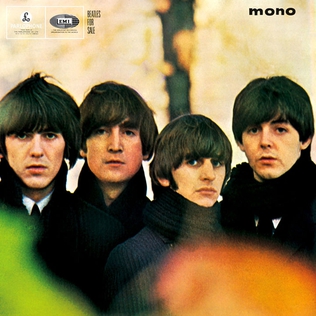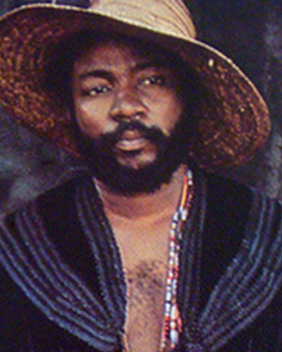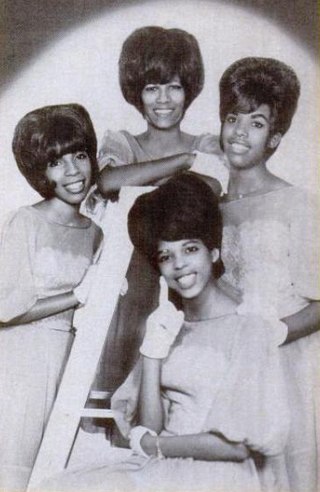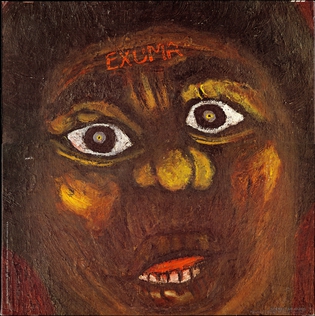
Beatles for Sale is the fourth studio album by the English rock band the Beatles. It was released on 4 December 1964 in the United Kingdom on EMI's Parlophone label. The album marked a departure from the upbeat tone that had characterised the Beatles' previous work, partly due to the band's exhaustion after a series of tours that had established them as a worldwide phenomenon in 1964. Beatles for Sale was not widely available in the US until 1987, when the Beatles' catalogue was standardised for release on CD. Instead, eight of the album's fourteen tracks appeared on Capitol Records' concurrent release, Beatles '65, issued in North America only.
Garage rock is a raw and energetic style of rock and roll that flourished in the mid-1960s, most notably in the United States and Canada, and has experienced a series of subsequent revivals. The style is characterized by basic chord structures played on electric guitars and other instruments, sometimes distorted through a fuzzbox, as well as often unsophisticated and occasionally aggressive lyrics and delivery. Its name derives from the perception that groups were often made up of young amateurs who rehearsed in the family garage, although many were professional.
Perrey and Kingsley was an electronic music duo made up of French composer Jean-Jacques Perrey and German-American composer Gershon Kingsley. The duo lasted from 1965 to 1967 and both are considered pioneers of electronic music. They released under Vanguard Records two studio albums The In Sound From Way Out! and Kaleidoscopic Vibrations. They also were among the first artists to incorporate the Moog synthesizer, prior to the successful 1968 release, Switched-On Bach by Wendy Carlos.

"Brown Sugar" is a song recorded by the English rock band the Rolling Stones. Written primarily by Mick Jagger, it is the opening track and lead single from their album Sticky Fingers (1971). It became a number one hit in both the United States and Canada. In the United Kingdom and Ireland, it charted at number two. In the United States, Billboard ranked it as the number 16 song for 1971.

First Rays of the New Rising Sun is a compilation album credited to American rock musician Jimi Hendrix, issued in April 1997 on MCA Records. Featuring songs mostly intended for his planned fourth studio album, it was one of the first releases overseen by Experience Hendrix, the family company that took over management of his recording legacy. It reached the album charts in the United States, United Kingdom, and four other countries.

"No Matter What" is a song originally recorded by Badfinger for their album No Dice in 1970, written and sung by Pete Ham and produced by Mal Evans.

Ultimate! is a comprehensive career retrospective album by English rock group the Yardbirds. The 52-song two–compact disc compilation was released in 2001 by Rhino Records. The tracks span the period from the group's first demo recordings in 1963 to the last singles in 1968. They include all 17 of the group's singles, both A-side and B-sides, supplemented with more than a dozen album tracks, their performance for the film Blow-Up, and three early solo numbers by singer Keith Relf.

Macfarlane Gregory Anthony Mackey, known professionally as Tony McKay and Exuma, was a Bahamian musician, artist, playwright, and author best known for his music that blends folk, rock, carnival, junkanoo, calypso, reggae, and African music stylings.

Kingdom Come is the debut studio album by American heavy metal band Sir Lord Baltimore, released on Mercury Records in 1970. The album is considered an important pioneer in stoner rock and heavy metal.

Iron Mountain Depot is John Hartford's sixth and final album issued by RCA Victor, released in 1970.

"Spill the Wine" is the debut single by singer Eric Burdon and the band War, released in May 1970. It was backed by the non-album track "Magic Mountain", and was War's first Billboard chart hit.

The Royalettes were a four-girl group from Baltimore, Maryland who exemplified the "sweet soul" style of the mid-60s.

Fresh Maggots are a folk duo from Nuneaton, Warwickshire in England, consisting of Mick Burgoyne and Leigh Dolphin, who played a variety of instruments including guitars, glockenspiel, tin whistles and strings. They released two albums in 1971 and 2020, but sustained interest in the 1970 album saw it re-released in several times.

Live at the BBC is a compilation live album of the British progressive rock band Curved Air from sessions on:
The Crusaders was an American garage rock band, whose 1966 album Make a Joyful Noise with Drums and Guitars is considered one of the first gospel rock releases, or even "the first record of Christian rock".
The Love Exchange was an American psychedelic rock band, best known for their single "Swallow the Sun", released in 1967. Sixteen-year-old Bonnie Blunt was the band's lead singer. They were signed by Uptown Records, a subsidiary of MCA Records.
"I Walk on Guilded Splinters" is a song written by Mac Rebennack using his pseudonym of Dr. John Creaux. It first appeared as the closing track of his debut album Gris-Gris (1968), credited to Dr. John the Night Tripper. The song has subsequently been performed and recorded by many other musicians, including Widespread Panic, The Neville Brothers, Cher, Marsha Hunt, Johnny Jenkins, Humble Pie, King Swamp, the Allman Brothers Band, Paul Weller, the Flowerpot Men, Michael Brecker, Tedeschi Trucks Band and Jello Biafra.

Exuma is the debut studio album by Bahamian folk musician Exuma. It was originally released in May 1970 on the Mercury label.

"The Changeling" is a song by the American rock band the Doors. It appears as the opening track on their sixth album and final with Jim Morrison, L.A. Woman. Released in April 1971, as the B-side of "Riders on the Storm", the single peaked at number 14 on the Billboard Hot 100 chart.

If Somebody Loves You is the fifth British album by the Dave Clark Five. It was released by EMI (Columbia) in 1970. The album contained four of the group's popular songs, the minor US hit "Red and Blue", and the successful UK singles "Live in the Sky", "Here Comes Summer", as well as the UK top 10 hit cover version of Chet Powers' "Everybody Get Together". A single featuring Mike Smith's ballad "Julia" had no success in the UK or the US, but reached No. 2 in Malaysia in August 1970. The album is the first to be released after the band's official breakup and was not available in the US.















